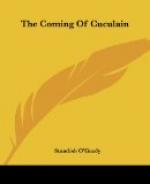We praise the man who rushes into a burning mansion and brings out its greatest treasure. So ought we to praise this man who rescued from the perishing Gaelic tradition its darling hero and restored him to us, and I think now that Cuculain will not perish, and he will be invisibly present at many a council of youth, and he will be the daring which lifts the will beyond itself and fires it for great causes, and he will also be the courtesy which shall overcome the enemy that nothing else may overcome.
I am sure that Standish O’Grady would rather I should speak of his work and its bearing on the spiritual life of Ireland, than about himself, and, because I think so, in this reverie I have followed no set plan but have let my thoughts run as they will. But I would not have any to think that this man was only a writer, or that he could have had the heroes of the past for spiritual companions, without himself being inspired to fight dragons and wizardy. I have sometimes regretted that contemporary politics drew O’Grady away from the work he began so greatly. I have said to myself he might have given us an Oscar, a Diarmuid or a Caoilte, an equal comrade to Cuculain, but he could not, being lit up by the spirit of his hero, be merely the bard and not the fighter, and no man in Ireland intervened in the affairs of his country with a superior nobility of aim. He was the last champion of the Irish aristocracy and still more the voice of conscience for them, and he spoke to them of their duty to the nation as one might imagine some fearless prophet speaking to a council of degenerate princes. When the aristocracy failed Ireland he bade them farewell, and wrote the epitaph of their class in words whose scorn we almost forget because of their sounding melody and beauty. He turned his mind to the problems of democracy and more especially of those workers who are trapped in the city, and he pointed out for them the way of escape and how they might renew life in the green fields close to Earth, their ancient mother and nurse. He used too exalted a language for those to whom he spoke to understand, and it might seem that all these vehement appeals had failed but that we know that what is fine never really fails. When a man is in advance of his age, a generation unborn when he speaks, is born in due time and finds in him its inspiration. O’Grady may have failed in his appeal to the aristocracy of his own time but he may yet create an aristocracy of character and intellect in Ireland. The political and social writings will remain to uplift and inspire and to remind us that the man who wrote the stories of heroes had a bravery of his own and a wisdom of his own. I owe so much to Standish O’Grady that I would like to leave it on record that it was he who made me conscious and proud of my country, and recalled my mind, that might have wandered otherwise over too wide and vague a field of thought, to think of the earth under my feet and the children of our common




